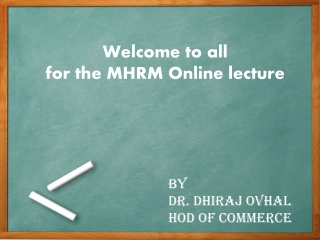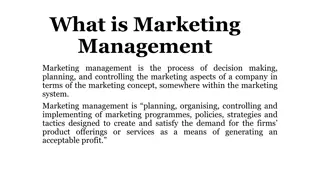
Importance of Strategic Marketing Planning and How It Drives Business Growth
Strategic marketing planning is crucial for businesses as it helps in decision-making, resource allocation, market understanding, competitiveness, and performance evaluation. By developing clear strategies, businesses can align their marketing activities with overall objectives, enhance customer satisfaction, differentiate themselves from competitors, and measure the effectiveness of their efforts.
Download Presentation

Please find below an Image/Link to download the presentation.
The content on the website is provided AS IS for your information and personal use only. It may not be sold, licensed, or shared on other websites without obtaining consent from the author. If you encounter any issues during the download, it is possible that the publisher has removed the file from their server.
You are allowed to download the files provided on this website for personal or commercial use, subject to the condition that they are used lawfully. All files are the property of their respective owners.
The content on the website is provided AS IS for your information and personal use only. It may not be sold, licensed, or shared on other websites without obtaining consent from the author.
E N D
Presentation Transcript
Strategic Marketing Planning 5thDec 2023
What is strategic marketing planning? Strategic marketing planning is one of the main functions of marketing management. It is the process in which a business develops marketing strategies to meet its strategic goals and objectives. The main steps include identifying the business's current situation, analysing its opportunities and threats, and mapping out marketing action plans for implementation (Alsem, 2023 and Marshall, G.W. and Johnston, M.W. 2023). This process is a structured approach to formulating and executing plans that drive businesses to success.
The Importance of Strategic Marketing Planning Drives decision-making and resource allocation Strategic marketing planning helps businesses to establish clear goals and objectives as benchmarks for marketing-related decisions. It provides a solid foundation for making decisions related to the key marketing activities like pricing, promotion, and distribution strategies (London School of Business & Finance 2023 and Landreth Grau, 2021). Additionally, Strategic marketing planning facilitates efficient project resource allocation by prioritizing initiatives that align with the overall business objectives and deliver the optimal return on investment (ROI).
The Importance of Strategic Marketing Planning Enhances market and customer understanding By gathering and analyzing valuable insights and information, organizations can discover emerging trends, identify current gaps in the market, and better understand their customers' needs and wants, preferences, and behavior patterns (London School of Business & Finance 2023). This enhanced understanding helps businesses to develop and deliver products or services that cater to the evolving needs of their target audience, therefore increasing customer satisfaction and loyalty.
The Importance of Strategic Marketing Planning Enhances competitiveness It helps organizations to identify their unique selling propositions and leverage them to differentiate themselves from competitors. By carving out a distinctive market position, organizations can set themselves apart from the competition and enhance their overall competitiveness (Alsem, 2023, Landreth Grau, 2021 and Marshall, G.W. & Johnston, M.W. 2023).
The Importance of Strategic Marketing Planning Facilitates measurement and evaluation Strategic marketing plans enable organizations to establish a clear framework to measure and evaluate their marketing performance. By setting SMART objectives and defining relevant KPIs, organizations can track their progress, analyze the effectiveness of their marketing efforts, and make data-driven adjustments as needed to optimize their marketing ROI (Ashill et al., 2003). Through the strategic marketing planning process, businesses can develop targeted campaigns that resonate with their audience and support their brand image, resulting in increased customer loyalty, improved profitability, and better sustainable growth.
Steps to create a strategic marketing plan Step 1: Define your marketing goals The first step in the strategic marketing process is to define marketing goals clearly. These goals should be specific, measurable, achievable, relevant, and time-bound (SMART). Marketing goals should be tailored to meet your overall business goals (Ashill et al., 2003). Step 2: Conduct market research Market research is a vital component of the strategic marketing planning process. It involves gathering and analyzing relevant data on the market, industry trends, customer preferences, and competitor activities. Through market research, a business can gain valuable insight that helps shape strategic decisions such as product development and competitive pricing (Marshall, G.W. & Johnston, M.W. 2023).
Steps to create a strategic marketing plan Step 3: Identify your target audience Understanding your target audience is essential in the strategic marketing planning process. By identifying your target customers, an organization can tailor their marketing messages and tactics to resonate with their pressing needs, preferences, and pain points (London School of Business & Finance 2023).
Steps to create a strategic marketing plan Step 4: Choose the right marketing channels and tactics Selecting the appropriate marketing channels and tactics enable a business to reach its target audience effectively. Marketing channels include the following. Social media content marketing email marketing and traditional advertising Organizations can choose their marketing channels based on the analysis of what works best with their target audience. Then, businesses can craft its marketing tactics to fit the chosen channels and align them with overall business goals (Ashill et al., 2003).
Steps to create a strategic marketing plan Step 5: Create a marketing budget Marketing budget helps organizations to allocate resources affectively and considering the potential return on investment (ROI) when allocating resources for different marketing channels and endeavors. Step 6: Develop marketing messages Marketing messages communicate proposition to the customer in a way that resonates with the buyer. These messages create a possibility for high conversion rates and customer retention (London School of Business & Finance 2023). a business s unique value
Steps to create a strategic marketing plan Step 7: Implement the strategy The implementation of a marketing strategy In an organization requires close monitoring to ensure all related factors are employed correctly. The execution of a marketing strategy is most effective once the plan is aligned with business resources and initiatives (Wilson, 2010 and Ashill et al., 2003). Step 8: Measure and analyze the results Measuring the success of a business's marketing efforts is essential for understanding what works for the organization. Monitoring key performance indicators (KPIs) such as conversion rates, website traffic, customer feedback, and sales revenue (Ashill et al., 2003) Businesses can use this data to gain more precise direction into the necessary steps for improving marketing campaigns.
Steps to create a strategic marketing plan Step 9: Evaluate and optimize Continuous optimization and improvement are crucial for the success of any business strategic plan. Businesses can ensure this by regularly assessing their performance. This step helps in identifying areas that need some improvement.
References Alsem, K.J. (2023) The Strategic Marketing Planning Process , Strategic Marketing Planning, pp. 31 57. doi:10.4324/9781003381488-3. Ashill, N.J., Frederikson, M. and Davies, J. (2003) Strategic Marketing Planning: A grounded investigation , European Journal of doi:10.1108/03090560310459032. Landreth Grau, S. (2021) Strategic Marketing Planning for nonprofit organizations , Marketing for Nonprofit doi:10.1093/oso/9780190090807.003.0003. Marshall, G.W. and Johnston, M.W. (2023) Marketing management. New York, NY: McGraw-Hill Education. Strategic Marketing Planning: Everything you need to know (no date) LSBF. Available at: https://www.lsbf.org.uk/blog/online-learning/strategic-marketing-planning-everything- you-need-to-know (Accessed: 03 December 2023). Wilson, R.M.S. (2010) Strategic doi:10.4324/9780080912127. Marketing, 37(3/4), pp. 430 460. Organizations, pp. 58 84. Marketing Planning [Preprint].






















